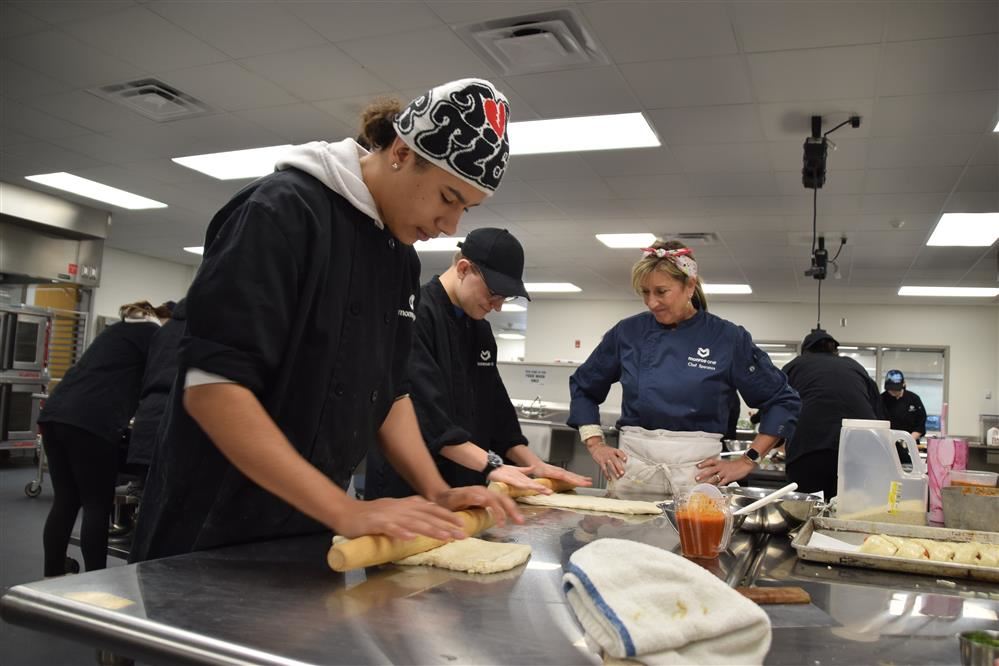- Eastern Monroe Career Center (EMCC)
- Program Information
- Culinary Arts
Program Information
Page Navigation
-
Program Information
- Auto Services
- Automated Manufacturing & Machining
- Childcare Professions
- CISCO Networking Academy
- Collision Repair Technology
- Construction Trades
- Cosmetology
- Culinary Arts
- Emergency Services
- Health Careers
- NEW! Human Performance and Exercise Science
- NEW! Interactive Media and Game Design
- Law and Public Safety (formerly Criminal Justice)
- Nail and Waxing Specialty
- New Vision Medical Careers
- PC Repair/Network Cabling
- Trade Electricity
- Visual Communication and Photography
- Welding and Fabrication
Culinary Arts

-
Program Highlights:
In this two-year NYSED-Approved CTE Program, students learn about the fast-paced careers of the food service industry. Students gain experience in both front- and back-of-the-house operations. Students begin by developing their knife skills and using appropriate cooking methods for different foods. Opportunity is provided for students to learn safe methods of food handling and storage through the ServSafe program. Initial food production is small scale. Students graduate to planning and production for a class-run restaurant, Three Seasons. Internships with other professionals in the field extend students' learning experience. Students develop both individual and team culinary skills.
-
Units of Study—Basic (Year 1)
- Baking
- Fruits & Vegetables
- Salads & Garnishes
- Sandwiches & Breakfast Foods
- Quick Breads
- Meat, Poultry & Seafood
- Stock, Soups and Sauces
- Pasta, Potatoes and Grains
- Yeast Breads
- Pies & Cakes
- International Foods
-
Units of Study—Advanced (Year 2)
- ServSafe®
- Purchasing & Inventory
- Cost Control
- Global Cuisine
- Marketing
- Restaurant Production
- Portfolio
- Restaurant Project
- Large Quantity Food Preparation
- Work Experience
-
Career Connections
- Dietician
- Dining-Room Manager
- Executive Chef
- Food Production Manager
- Food Technologist
- Kitchen Assistant
- Nutritionist
- Pastry Chef/Baker
-
College Programs
- Executive Chef
- Food and Beverage Director
- Food Management
- Food Production Manager
- Food Service Administration
- Food Technologist
- Hotel/Restaurant Management
- Nutrition and Dietetics
- Sous Chef
-
High School Credit
- 3.5 CTE a.m./3.0 CTE p.m. (max)
Includes:- 1.0 English 12 (Advanced)
- 1.0 Technical Math (Advanced)
- 3.5 CTE a.m./3.0 CTE p.m. (max)
-
College—Dual Enrollment
-
College—Articulation
- Johnson and Wales (FAST)
- Monroe Community College (ServSafe®)
-
Items to Consider
Successful students:
-
- Work within the Board of Health regulations.
- Follow safety procedures and practice safe work habits at all times.
- Work safely with knives and other potentially dangerous equipment.
- Work cooperatively within a team.
- Work long hours on foot in hot and cramped areas.
- Are physically fit, as food service is a strenuous and physically demanding job.
- Wear a chef's coat, pants, and hat.
- Purchase a hat (approximately $15).
-

